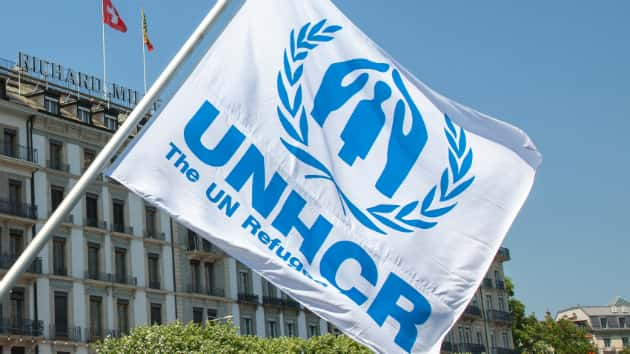Durable Solutions Expert – UNHCR
Job Description
| Organization | United Nations High Commissioner for Refugees |
| Job Title | Durable Solutions Expert – National Consultancy, Khartoum |
| Location | Khartoum, Sudan |
| Hardship Level | C |
| Job ID | 34525 |
| Salary Grade | |
| Family Location Type | Family |
| Closing Date | 25/03/2022 |
Eligible Applicants
This Job Opening is available to eligible UNHCR staff members and external applicants.
Procedures and Eligibility
Interested applicants should consult the Administrative Instruction on Recruitment and Assignment of Locally Recruited Staff (RALS). Applicants must be nationals of, and be locally recruited within the country of their employment.
Duties and Qualifications
Durable Solutions Expert
- Overall purpose and Scope of Assignment:
The consultant will support UNHCR Sudan in Government liaison and pushing forward the relevant elements of the TGOS Constitutional Declaration, the Peace Agreement, and the GOS GRF pledges in relation to:
- Durable Solutions for IDPs and Sudanese refugees
- Durable Solutions for refugees and asylum seekers in Sudan
Main Outcomes of the Advisory Role
The following are the main envisaged outcomes:
- Working with relevant Government institutions and civil society groups on how UNHCR can engage with, as well as their relative capacity in relation to UNHCR¿s mandate and in relation to achieving durable solutions to displacement for the two target groups (Sudanese displaced and refugees in Sudan).
- Strategic political analysis and a detailed SWOT analysis of UNHCR¿s engagement in the process of DS for the two target groups.
- A defined and negotiated, inclusive process to move forward on the implementation of the GOS GRF pledges. The process should include relevant parts of the Transitional Government of Sudan, UNHCR, relevant UN and NGO partners, the international community, and other stake holders. The process should also include the voices and views of a cross-section of refugee communities.
- An advocacy strategy that accompanies the above-mentioned process to gain support for the GCR process both at the national and state levels.
- Support to the IGAD High Level meeting process as required.
Main Tasks of the Advisory Role
The following are the main tasks:
- Facilitate policy dialogue with the Transitional Government of Sudan and support the formation of the whole of government coordination structure for the GRF pledges
- Guide, advise, and support the development of a Government engagement strategy for durable solutions for IDPs and returning refugees in Sudan, as well as refugees of all nationalities in Sudan.
- Advise on the initiation and establishment of a high-level process with federal and state authorities, the UN Country Team, civil society and donors for the development of a durable solutions strategy for IDPs
- Advise on the initiation and establishment of a high-level process with federal and state authorities, the UN Country Team, civil society and donors for the development of a CRRF strategy for refugees in Sudan in line with the GOS commitments under the Global Refugee Forum.
Hosting and Contractual Arrangements
The following hosting and contractual arrangements will be established:
- The advisor will be contracted as a Consultant
- In implementing the tasks under section 8 (Main Tasks of the Advisory Role), the advisor will be supported by the UNHCR office in Khartoum.
- Time allocation to fulfil this role will initially be 24 working days within a timeframe of three (3) months (3 days per week for three months), beginning February 2022.
- Level of responsibilities required: Level B
- Monitoring and Progress Controls (report requirements, periodicity, format, deadlines):
a. The final product (e.g., survey completed, data collected, workshop conducted, research documents produced specify): Constant stream of web content produced.
b. Delivery Periodicity, as applicable:
c. Work on the basis of time employed Yes 1 No 0
- Consultancy Duration: 3-Month
- Payment schedule: Upon achieving the deliverables on a monthly basis
6. Supervisor of Project/Individual consultant (Name and title): Mr. Axel Bisschop, Representative, RO Khartoum, Sudan
See below for this postion’s Operational Context
Protracted displacement of Sudanese refugees and IDPS:
Sudan is in a three-year governance transition phase following the fall of former President Al Bashir in April 2019. On 17th August 2019, the Transitional Military Council and the Forces for Freedom and Change (FFC) signed a Constitutional Declaration agreeing on transitional arrangements for the forthcoming 39-months. The Constitutional Declaration, which governs the transition period, envisages the completion of a fair and comprehensive peace in Sudan and addresses the root causes of the conflict. The signing of a peace agreement with several armed groups on 31 August 2020 was an important step and negotiations with the remaining two larger armed groups is on-going. Ending the long-running conflict will be a key challenge, not least given the displacement of over two million people.
While the political and overall context in Sudan witnessed a historic shift in 2019, the humanitarian and development aspects have been subject to a continuous and significant decline, including through recent shocks such as the COVID-19 pandemic and the heaviest flooding seen in decades. Protracted and new displacements continue to be a major issue as a result of decades of conflict and natural disasters, with approximately 1.86 million internally displaced persons (IDPs) living in Sudan, with 1.6 living in Darfur. The economic crisis in the country continues to affect all sectors of society with hyper-inflation, fuel and bread shortages, and ever-increasing prices of basic commodities.
Since 2017, the former Government of Sudan and the international community have been working together to support durable solutions for IDPs jointly. From the international communities¿ side, this has been guided by the Durable Solutions Working Group (DSWG), and there has been a focus upon quality evidence and analysis and designing of area-based action plans to inform durable solutions strategies and prioritise responses adequately. The Transitional Government of Sudan takes the national lead on Durable Solutions and has officially requested support on durable solutions of IDPs and Sudanese Refugees to the Secretary-General with regards to the post-UNAMID United Nations configuration. Returns and reintegration are central issues in the Juba peace agreement.
On 3 June, the Security Council, through resolution 2524 (2020), established the United Nations Integrated Transition Assistance Mission in Sudan (UNITAMS). The mission has four mandated tasks: supporting the democratic transition, the peace process, peacebuilding, and the mobilization of aid. Durable solutions are a critical component across four priorities. The mission and will be building on the progress and existing programming of the United Nations Country Team (UNCT) on durable solutions.
Refugees and asylum seekers in Sudan:
In Sudan, there are almost 1 million refugees and asylum seekers. Sudan¿s refugee operation is characterised by several implementation models. In East Sudan 100,000 Eritrean refugees are served in a stagnant, protracted, costly operation with heavy COR involvement and long-standing NGO-run parallel services in 9 camps. Ethnic politics in East Sudan have also complicated efforts to do full population and nationality verification in the camps. Donor interest in East Sudan is significant because of the continuous influx of Eritrean youth, mixed migration flows and trafficking dynamics.
UNHCR has sought to minimize the number of camps for South Sudanese refugees in Sudan and has made efforts to minimize parallel services in the 11 South Sudanese refugee camps in White Nile State and East Darfur and other large settlements. However, NGO services remain essential to complement Government efforts as basic services do not meet minimum standards. Funding shortfalls, geographic spread of the population, exploitative labour practices for refugees, and uneven implementation of government policies have exacerbated the poor living conditions of South Sudanese refugees.
Some 40,000 South Sudanese live in squalid slums called ¿Open Areas¿ in Khartoum with very limited services and assistance programs. On the other hand, the 20,000 individually registered non-South Sudanese refugees and asylum seekers in Khartoum have access to a fully-fledged urban support program implemented by COR and several NGOs. Funding constraints prevent the inclusion of South Sudanese refugees into the urban refugee program. There is also an on-going small-scale influx of CAR refugees into Darfur, with the population having reached 25,000 over the past three years.
Following the Global Compact on Refugees (GCR), affirmed by the United Nations General Assembly in December 2018, the High Commissioner for Refugees, in consultation with States and other stakeholders, convened the first periodic Global Refugee Forum (GRF) in Geneva in December 2019, for all United Nations Member States, together with relevant stakeholders, to announce pledges and contributions towards the objectives of the GCR. The Government of Sudan (GoS) announced nine pledges. In addition, donor governments, UN agencies, NGOs and private sector actors made 19 pledges that could benefit Sudan.
UNHCR will support GoS to put together a realistic, phased roadmap to operationalise the GRF pledges including mainstreaming refugee services into national systems and aligning the national displacement policies on freedom of movement and the right to work with international standards. The roadmap should include immediate actions to align the GoS policies approach with the CRRF principles such as handing over the education and water sectors in East Sudan to the appropriate Ministries, as well as longer-term area-based interventions which will enhance livelihoods, inclusive government service delivery for refugees and Sudanese host communities in out-of-camp settings, focusing on minimum standards in life-saving sectors, and including refugees in state level development plans.
Closing Date
This Consultancy JO will closed on 25/03/2022.


